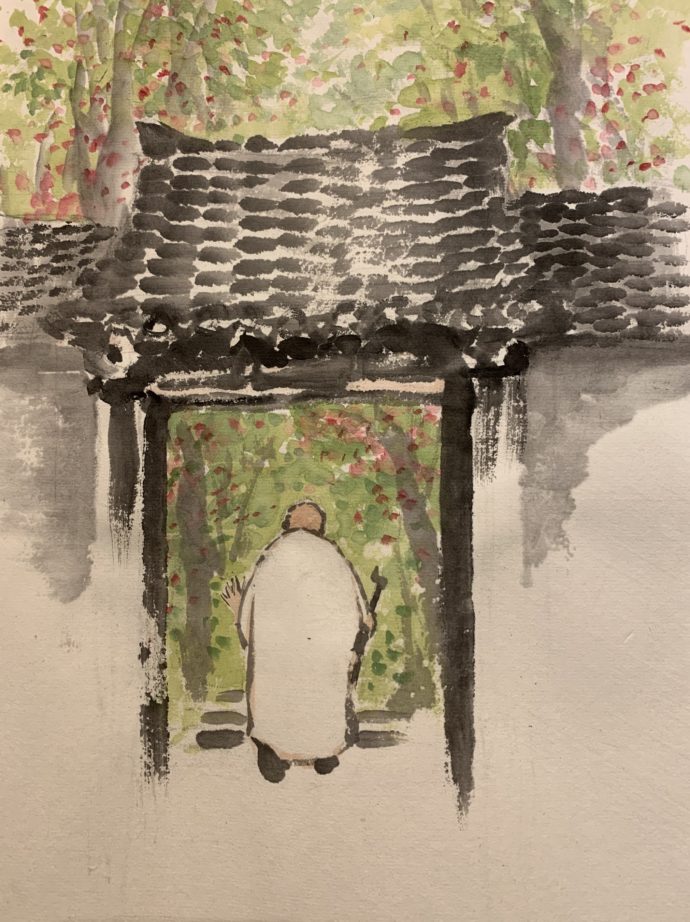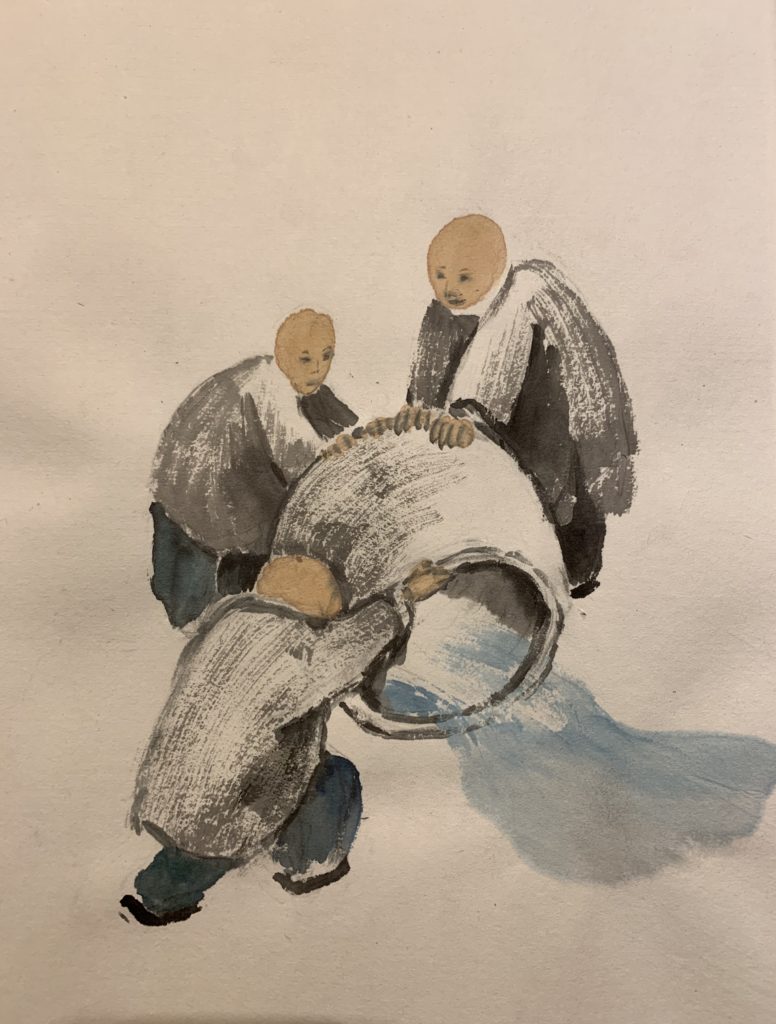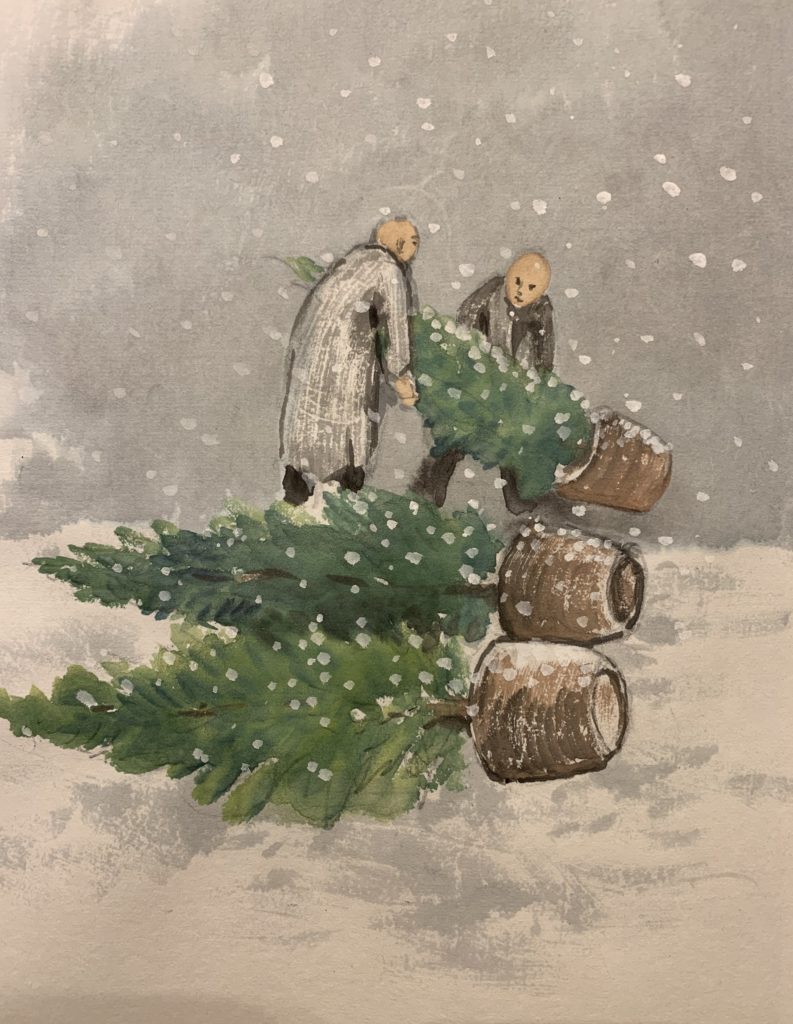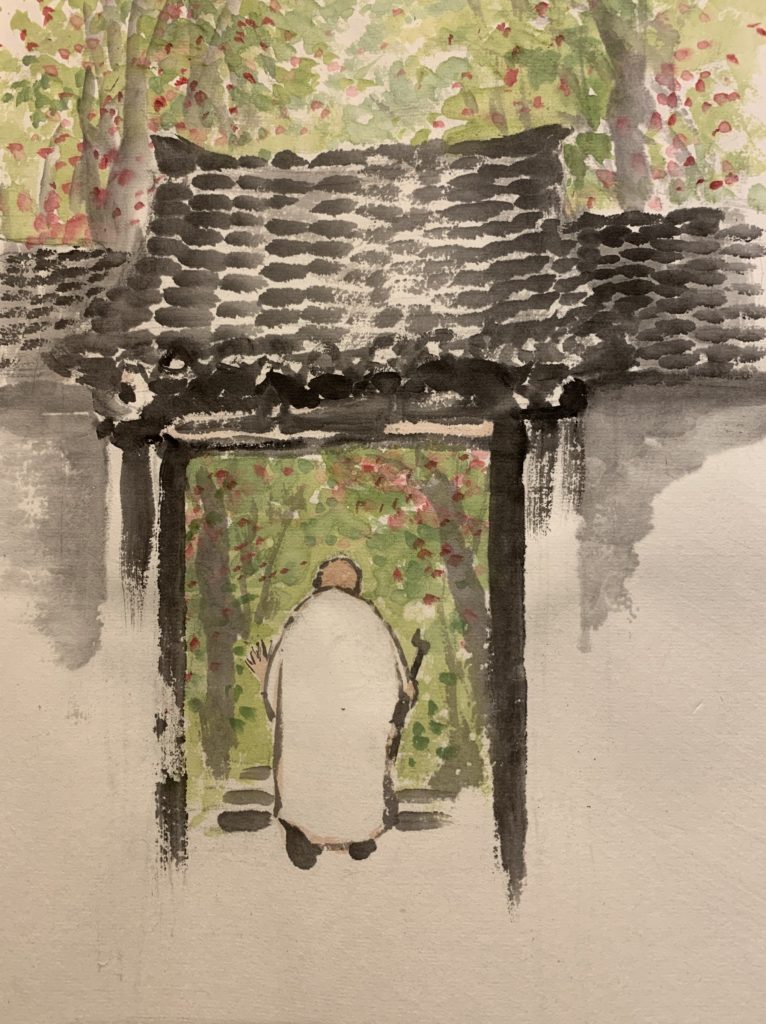超越出版社
劉墉原創散文:〈放下.放空.放平.放心.放手〉
By SYZ站長 | 2020/02/11 |

這是我多年前寫的《小沙彌》的故事,有些言外之意:碰上難以抵抗的災難,先屈就,把自己放空、放平,等待春天的來到。配上新畫的插圖和英譯,與大家共勉!
《放下.放空.放平.放心.放手》
新來的小沙彌,對什麼都好奇。秋天,禪院裡紅葉飛舞,小沙彌跑去問師父:「紅葉這麼美,為什麼會掉呢?」
師父一笑:「因為冬天來了,樹撐不住那麼多葉子,只好捨。這不是『放棄』,是『放下』!」
冬天來了,小沙彌看見師兄們把院子裡的水缸扣過來,又跑去問師父:「好好的水,為什麼要倒掉呢?」
師父笑笑:「因為冬天冷,水結凍膨脹,會把缸撐破,所以要倒乾淨。這不是『真空』,是『放空』!」
大雪紛飛,厚厚地,一層又一層,積在幾棵盆栽的龍柏上,師父跟小沙彌合力把盆搬倒,讓樹躺下來。小沙彌又不解了,急著問:「龍柏好好的,為什麼弄倒?」
師父臉一整:「誰說好好的?你沒見雪把柏葉都壓塌了嗎?再壓就斷了。那不是『放倒』,是『放平』,為了保護它,教它躺平休息休息,等雪霽再扶起來。」
天寒,加上全球金融危機,香油收入少多了,連小沙彌都緊張,跑去問師父怎麼辦?
「少你吃?少你穿了嗎?」師父瞪一眼:「數數!櫃裡還掛了多少衣服?柴房裡還堆了多少柴?倉房裡還積了多少土豆?別想沒有的,想想還有的;苦日子總會過去,春天總會來到。你要放心。『放心』不是『不用心』,是把心安頓。」
春天果然跟著來了,大概因為冬天的雪水特別多,春花漫爛,更勝往年,前殿的香火也漸漸恢復往日的盛況。師父要出遠門了,小沙彌追到山門:「師父您走了,我們怎麼辦?」
師父笑著揮揮手:「你們能放下、放空、放平、放心,我還有什麼不能放手的呢?」
放,不是放棄、不是放任、不是放恣、不是放縱、不是放逐。
不曾拿起,怎麼放下?
不曾擁有,怎麼放空?
不曾獨立,怎麼放平?
不曾掛念,怎麼放心?
不曾抓緊,怎麼放手?
有收才能放,有放才能收!
Little monk is new to the temple and curious about everything.
It’s autumn. Red foliage flutters in the zen garden. Little monk asks Master, “These leaves are so beautiful, but why do they fall?”
Master smiles. “Winter is coming, the tree can’t hold on to so many leaves, so it must choose. The tree doesn’t give up, so it must choose to let go.”
It’s winter. Curious monk sees elder monks turning over the cisterns one by one. He asks Master, “There’s still good water in many of them, why must we pour the water out?
Master smiles. “Because when the water freezes, it will crack the tanks. To save them for the future, we should unload them now.”
A blizzard comes, sweeping piles of thick snow onto the junipers. Master asks the little monk to help him tip the potted saplings over.
The little monk is confused. “Aren’t saplings supposed to stand straight? Why lie them down?”
Master replied seriously: “Don’t you see how the snow is weighing them down? By laying them down, we are protecting them. We give them a rest, so they may stand after the snow.”
The winter is harsh and long, and with a global recession, the temple’s offering box is running empty. Even the little monk is looking to the Master anxiously. Master returns a glance.
“Have you been eating or wearing less?” Master replies. “Go see for yourself, how many clothes are there in the closet? How many piles of firewood are there in the shed? How many bags of potatoes are there in the barn? Stop thinking about what we don’t have, and think about what we do have; the hard times will pass, and spring will come. You need to let go of your worries, by being more mindful of what you have. This will calm your heart.”
Spring did indeed arrive, and the thawing snow made for even more blossoms than last year. Worshippers returned, and the offering box is full again. It is then that Master sets off on a very long journey. Little monk runs up to him at the mountain gate. “Master! When you are gone, what are we to do?”
Master smiles and waves his hand. “You have already learned how to let go, to unload, to rest up and to calm down. Why should I not be rest assured?”
Letting go is not letting alone. It’s not to abandon and it’s not giving up. It doesn’t indulge with abandon, nor does it abandon through rejection.
If you’ve learned to pick up, you must also learn to put down.
If you’ve learned to acquire, you must also learn to unload.
If you’ve learned to strive, you must also learn to rest.
If you’ve learned to care, you must also learn to trust.
If you’ve learned to hold on, you must also learn to let go.
Just as you need to take in order to give, you must give in order to take.
♥ 歡迎轉載及分享,但請尊重原創,如轉貼請勿修改,並附上所有原連結,謝謝!
SYZ站長
水雲齋的「心」很大,但「規模」很小,於1991年成立時,以《超越自己》和《我不是教你詐》等勵志出版品影響了大中華地區數代青年學子。20餘年來,水雲齋以「文學、藝術、教育」為主力營運方向,承接影視專輯策劃製作、舉辦演講和企業訓練、與國內外眾多基金會合辦公益活動,並持續捐贈資源給國內外公益組織,致力於對社會有正面的貢獻。



